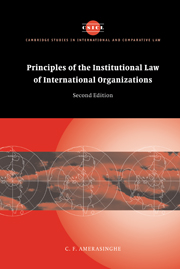Book contents
- Frontmatter
- Contents
- Preface
- List of abbreviations
- Table of cases
- 1 Introduction
- 2 Interpretation of texts
- 3 Legal personality
- 4 Membership and representation
- 5 Non-Judicial organs of organizations
- 6 Acts of non-judicial organs: their legal effect
- 7 Acts of non-judicial organs: the doctrine of ultra vires
- 8 Judicial organs
- 9 The internal law: employment relations
- 10 Privileges and immunities
- 11 Financing
- 12 Responsibility to and of international organizations
- 13 The liability of member states vis-à-vis third parties
- 14 Amendment of constitutions
- 15 Dissolution and succession
- 16 The settlement of disputes
- Index
- Cambridge Studies in International and Comparative Law
7 - Acts of non-judicial organs: the doctrine of ultra vires
Published online by Cambridge University Press: 10 December 2009
- Frontmatter
- Contents
- Preface
- List of abbreviations
- Table of cases
- 1 Introduction
- 2 Interpretation of texts
- 3 Legal personality
- 4 Membership and representation
- 5 Non-Judicial organs of organizations
- 6 Acts of non-judicial organs: their legal effect
- 7 Acts of non-judicial organs: the doctrine of ultra vires
- 8 Judicial organs
- 9 The internal law: employment relations
- 10 Privileges and immunities
- 11 Financing
- 12 Responsibility to and of international organizations
- 13 The liability of member states vis-à-vis third parties
- 14 Amendment of constitutions
- 15 Dissolution and succession
- 16 The settlement of disputes
- Index
- Cambridge Studies in International and Comparative Law
Summary
In explaining the meaning of ultra vires in national law a leading law dictionary gives several possible meanings of the term depending on the context in which it is used and on the nature of the legal person in connection with whose acts the term is applied. The principal general meaning ascribed is similar to that which was given in a case decided by a US court: an ultra vires act is one performed without any authority to act on the subject. Text writers on national law do not generally attempt a comprehensive definition of the term. Writers on English administrative law refer to acts outside or ‘beyond the scope’ of the powers of bodies and then describe the elements which constitute acts ultra vires. French administrative law commentators and lexicographers use the term ‘excès de pouvoir’ to cover the ‘ensemble des violations … du principe de légalité’ but are more concerned about the misuse of authority or abuse of power. In national law, particularly in common law jurisdictions, the term ultra vires is used in constitutional law, administrative law and corporate law but with differing emphasis. The doctrine, however, is accepted without question in national legal systems.
Before the definition of ultra vires in international institutional law is approached, it is useful to consider some of the basic questions which have been or may be raised in regard to the doctrine and in general the answers given to them.
- Type
- Chapter
- Information
- Publisher: Cambridge University PressPrint publication year: 2005



